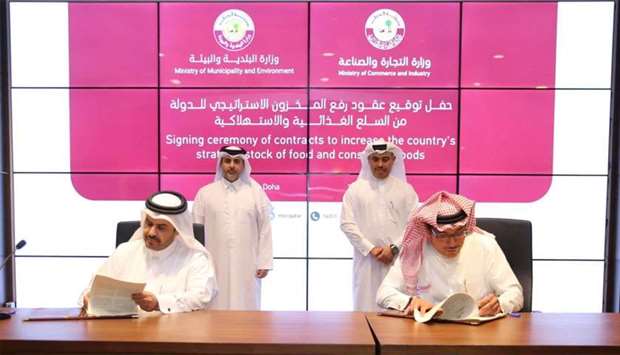Qatar on Thursday signed agreements to increase its strategic foodstuff reserves.
The contracts were signed in the presence of HE the Minister of Commerce and Industry Ali bin Ahmed al-Kuwari and HE the Minister of Municipality and Environment Abdullah bin Abdulaziz bin Turki al-Subaie, who is also the Chairman of the follow-up committee for the implementation of food security policies in the government and private sectors.
HE the Undersecretary for Consumer Affairs and head of the Strategic Storage Working Group for Food Security at the Ministry of Commerce and Industry, Sheikh Jassim bin Jabr bin Hassan al-Thani, signed the contracts with 14 major companies specialised in the food sector in the country.
The agreements are in line with the State's food security plans and also aligns with the Ministry of Commerce and Industry's efforts to enhance partnership between the public and private sectors.
The initiative seeks to strengthen Qatar's position as one of the most prominent countries in the region in terms of adequacy in the strategic stock of goods and the ability to achieve food security to meet the needs of its citizens and residents.
Under the agreements, efforts will be made during the first stage to increase the stocks of strategic commodities, especially wheat, rice, cooking oils, sugar, frozen red meat, long-life milk, and powdered milk.
Qatar has launched several initiatives aimed at establishing integrated mechanisms that would increase its strategic stocks of food and consumer goods to support its development policies in food security.
The State has also launched an electronic system to manage and monitor the strategic stocks, with the aim of activating the partnership between the government and private sectors.
The electronic system will enable the authorities to monitor and follow up the State's strategic stock of food and consumer goods, set import rates and establish import sources, identify the most important companies specialised in the field, and monitor the movement of internal trade and national production in the country.
It will also help keeping track of the strategic stock accurately and assessing the effectiveness of recycling in the local markets in a manner that preserves the quality and suitability of the products.
This system also serves as an important tool for officials and decision-makers, institutions and departments operating in this field, private sector companies, primary suppliers and national producers.
It also provides an accurate monitoring mechanism for the State's strategic food commodities and crucial consumer products, and any other materials that are added to the system.
The electronic system will provide access to details related to these commodities, including their types, quantities, methods and quality of its storage as well as available space in the warehouse, its locations, suppliers and distribution points, in addition to monitoring and managing all elements of the supply chain from import, storage, recycling, distribution and national production.
The strategic stock management and control system is based on the latest technology and employs Artificial Intelligence (AI) and the Internet of Things (IoT) by supporting decision-making and providing differential hypotheses of supply chains and providing effective solutions to meet and alleviate the challenges that would affect any part of the system.

